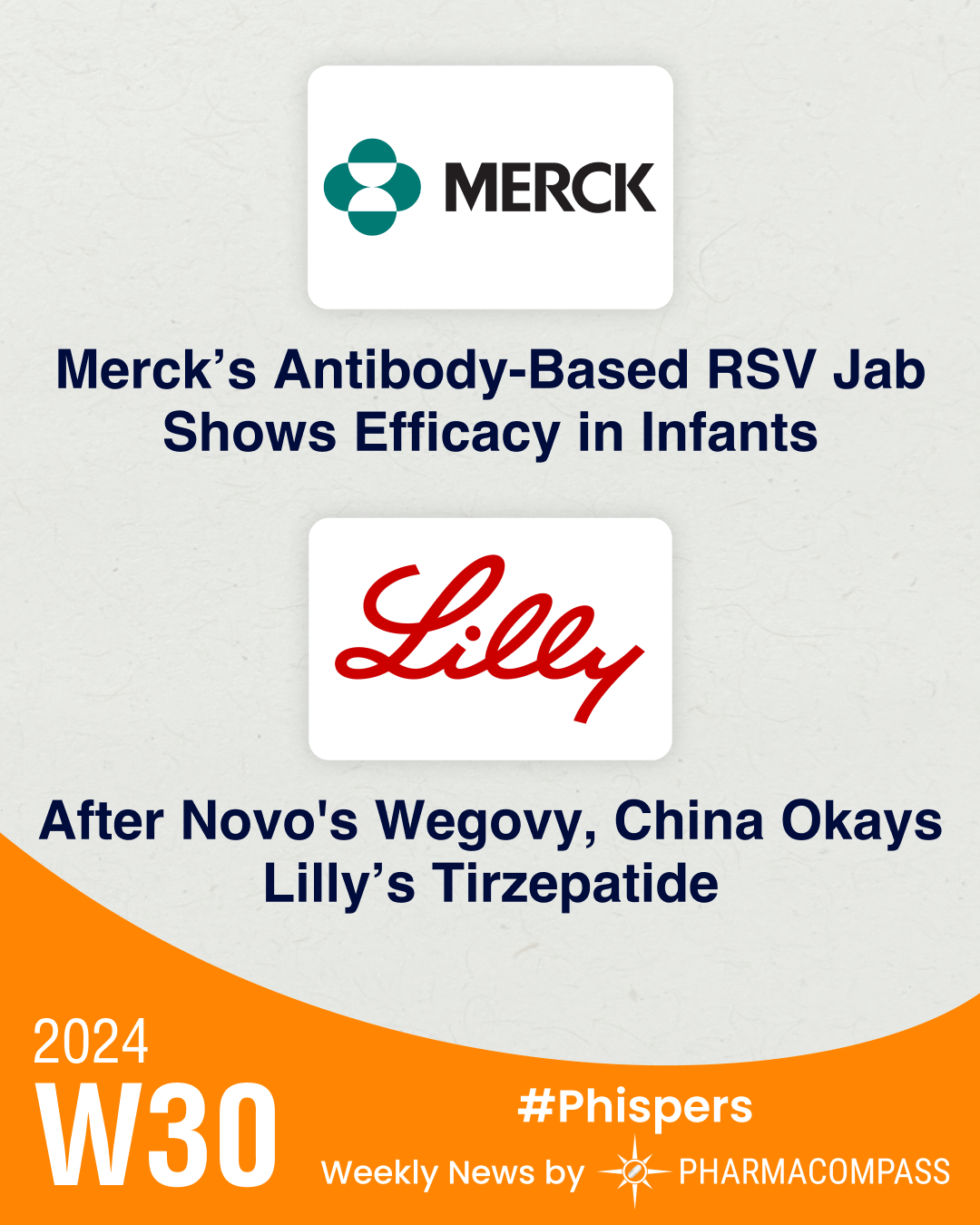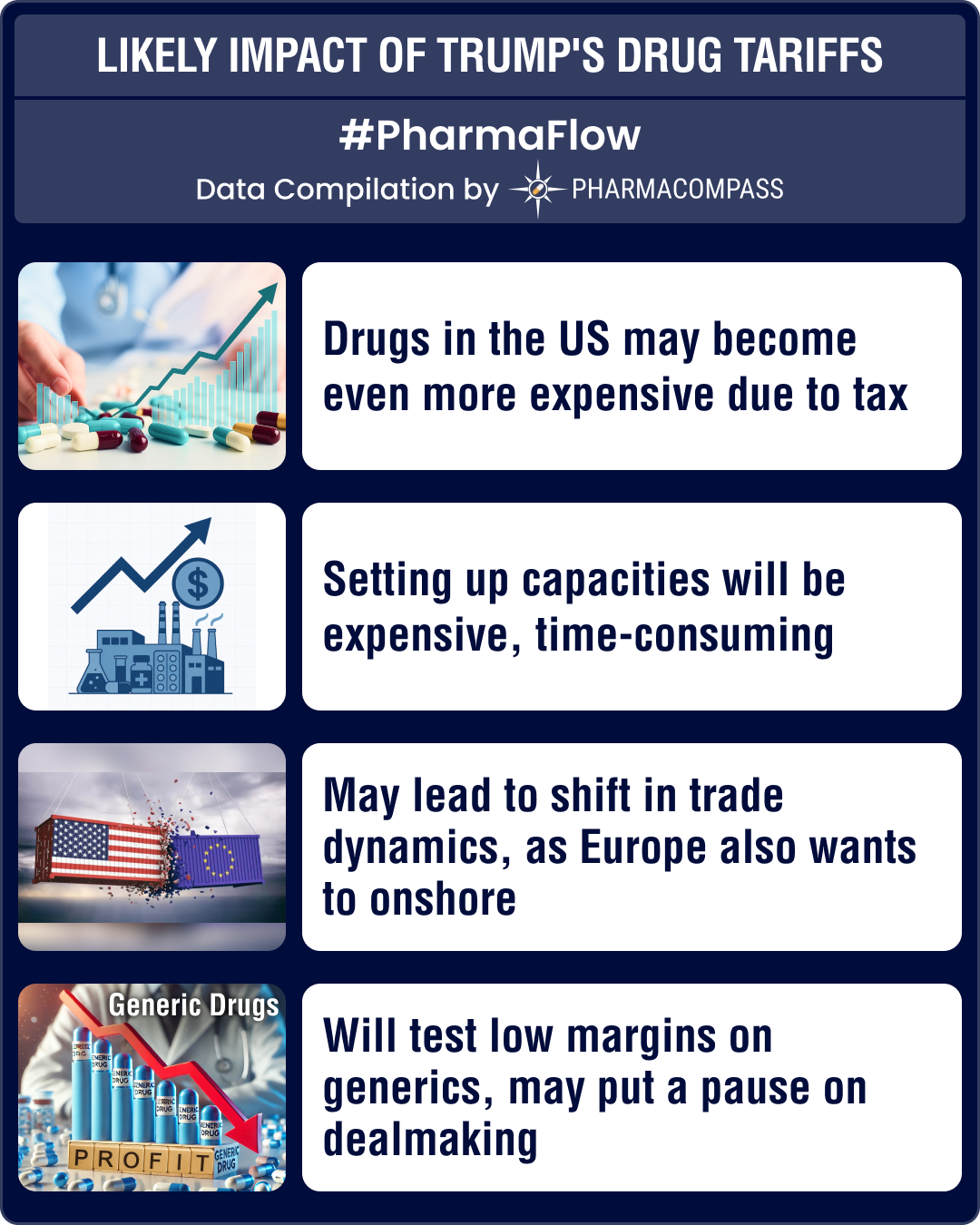
By PharmaCompass
2024-07-25
Impressions: 1,071 (Article) || 4 (Video)
This was a week when the US President Joe Biden ended his reelection bid, after giving America the Inflation Reduction Act that allows Medicare to negotiate drug prices. The week didn’t see major drug approvals in the US. But China approved Lilly’s tirzepatide, a month after okaying Novo Nordisk’s Wegovy. This approval in the world’s second largest pharmaceutical market has intensified rivalry in the weight loss market.
The week also saw a slew of activity around drug manufacturing. Agilent has agreed to buy the Canadian contract development and manufacturing organization (CDMO) Biovectra for US$ 925 million. Novo Nordisk has broken ground on a 200-acre site to construct a new production plant. BeiGene has opened a flagship facility in New Jersey with biologics manufacturing capabilities and Pfizer has cut the ribbon on a US$ 743 million extension of an API plant in Singapore.
In trials, Merck’s antibody-based injection hit its main goal of protecting infants from the respiratory syncytial virus (RSV) and GSK’s Dovato proved to be non-inferior to Gilead’s Biktarvy in a head-to-head matchup in treating HIV.
In other news from trials, Pfizer’s gene therapy for hemophilia A significantly cut the number of annual bleeding episodes in patients with the rare disorder. And Sage and Biogen have decided to scrap trials on a drug that was being studied as a treatment for essential tremor, a nervous system condition.
The European Commission (EC) has accepted CSL Vifor’s offer to address potential EU antitrust violations after it allegedly disparaged its Danish rival Pharmacosmos. And the US Food and Drug Administration (FDA) hit Indian drugmaker Brassica with a warning letter after it found employees routinely fabricating data results.
Merck’s RSV injection protects infants in trial, to file data with global regulators
Merck said its monoclonal antibody jab to protect infants against RSV-related infections has met the main goals of a mid-to-late-stage trial. Merck didn’t go into details but said clesrovimab reduced medically attended lower respiratory infections caused by RSV through day 150.
The New Jersey drugmaker will file the data with global regulators. Currently, FDA has approved Sanofi and Astra’s Beyfortus for preventing RSV in children up to 24 months.
GSK’s Dovato proves to be non-inferior to Gilead’s Biktarvy: In the largest study of its kind, GSK’s HIV drug Dovato (dolutegravir/lamivudine) was found to be non-inferior to Gilead Sciences’ Biktarvy (bictegravir/emtricitabine/tenofovir alafenamide) which is seen as the benchmark for HIV treatment. Significantly, Dovato did so with lesser weight gain in a 48-week head-to-head study of virologically suppressed HIV-1 patients. Both Dovato and Biktarvy are single pill treatments for HIV given once a day. Biktarvy raked in US$ 11.9 billion in 2023.
After Novo’s Wegovy, China approves Lilly’s tirzepatide for weight loss
The Novo Nordisk-Eli Lilly rivalry in the field of weight loss drugs has got intensified with China, the world’s second largest market for pharmaceuticals, approving Lilly’s weight loss drug tirzepatide. The approval from the Chinese regulators for tirzepatide comes around a month after its rival Novo Nordisk’s Wegovy (semaglutide) was approved in China.
Agilent to buy CDMO Biovectra; Novo, BeiGene, Pfizer expand capacities
Agilent Technologies has agreed to buy the CDMO Biovectra for US$ 925 million. Canada-based Biovectra is capable of fill-and-finish services and can produce complex APIs. It also specializes in fast-growing segments like antibody-drug-conjugates (ADCs) and GLP-1 drugs.
Meanwhile, there was a lot of news on capacity expansions. For instance, Novo Nordisk purchased a 200-acre site in the Danish city of Odense to build a new production plant, a Reuters report said. A report submitted to authorities revealed the Danish drugmaker plans to include fill-finish facilities to fill injector pens.
Similarly, BeiGene has opened a flagship facility in Hopewell, New Jersey, which houses state-of-the-art biologics manufacturing capabilities and a clinical research and development center. The 42-acre facility is projected to “create hundreds of skilled high-tech jobs at the site by the end of 2025.” And Pfizer is investing SGD$ 1 billion (US$ 743 million) to expand its API manufacturing facility in Singapore to meet the needs of oncology, pain, and antibiotic medicines.
CSL Vifor to highlight rival’s product in campaign to resolve anti-trust probe
In a unique settlement, CSL Vifor will launch a marketing campaign spotlighting its Danish rival’s product rather than its own in order to resolve an antitrust probe in the EU. This follows a two-year investigation by the European Commission alleging Vifor disparaged Pharmacosmos' iron deficiency treatment Monofer (ferric derisomaltose) in a campaign targeting healthcare professionals. Monofer is possibly the sole competitor in Europe to Vifor's flagship intravenous iron medicine Ferinject (ferric carboxymaltose). Vifor has made a 10-year pledge to “launch a comprehensive and multi-channel communication campaign to rectify and undo the effects of the potentially misleading messages previously disseminated by Vifor regarding the safety of Monofer.”
Pfizer scores late-stage trial win for its gene therapy for hemophilia A
In a late-stage trial, Pfizer’s gene therapy for hemophilia A — giroctocogene fitelparvovec — significantly cut the number of annual bleeding episodes in patients with the rare disorder.
The data takes Pfizer one step closer to securing an FDA approval for this hemophilia A drug. In April, FDA had approved Beqvez as a one-time gene therapy for hemophilia B. If approved, Pfizer’s hemophilia A gene therapy will compete with BioMarin’s Roctavian.
Biogen, Sage to abandon trial on essential tremor drug after trial failure
After Sage and its partner Biogen’s pill Zurzuvae (zuranolone) could not secure FDA approval for treating clinical depression in August last year, the partnership has faced yet another setback.
Their drug — SAGE 324 — which was being studied as a treatment for essential tremor (ET), a disorder that causes uncontrollable shaking of hands, arms and other parts of the body, has failed a phase 2 trial. “Given these results, Sage and Biogen will close the ongoing open label safety study of SAGE-324 in ET and do not plan to conduct further clinical development of SAGE-324 in ET,” a statement said.
FDA issues warning letter to Indian drugmaker after employees fabricate records
Indian CDMO Brassica Pharma was hit with a warning letter from the FDA after the US agency found it was a “routine practice” at its plant “to not test all batches for sterility and to fabricate records for those samples not tested.” FDA also pointed out that operators wore torn and stained clothing while performing aseptic processing activities, which could lead to contamination. FDA deemed Brassica’s response to the Form 483 it issued to be inadequate.
The PharmaCompass Newsletter – Sign Up, Stay Ahead
Feedback, help us to improve. Click here
Image Credit : Phisper Infographic by PharmaCompass license under CC BY 2.0
“ The article is based on the information available in public and which the author believes to be true. The author is not disseminating any information, which the author believes or knows, is confidential or in conflict with the privacy of any person. The views expressed or information supplied through this article is mere opinion and observation of the author. The author does not intend to defame, insult or, cause loss or damage to anyone, in any manner, through this article.”








